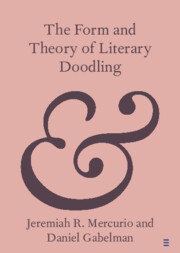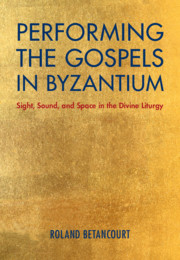Refine search
Actions for selected content:
22 results
Chapter 2 - Glossing Restitution
-
- Book:
- Practices of Restitution
- Published online:
- 19 December 2025
- Print publication:
- 22 January 2026, pp 31-70
-
- Chapter
-
- You have access
- Open access
- HTML
- Export citation
HOW FRANCIS DOUCE (1757–1834) ANNOTATED THE EARLY FRENCH PRINTED VOLUMES IN HIS COLLECTION
-
- Journal:
- The Antiquaries Journal / Volume 105 / October 2025
- Published online by Cambridge University Press:
- 31 July 2025, pp. 142-164
- Print publication:
- October 2025
-
- Article
-
- You have access
- Open access
- HTML
- Export citation

The Form and Theory of Literary Doodling
-
- Published online:
- 18 February 2025
- Print publication:
- 20 March 2025
-
- Element
- Export citation
4 - Al-Urmawi Goes to the Mustansiriyya: How to Learn the Science of Music
- from Part I - Context
-
- Book:
- The Science of Music
- Published online:
- 19 December 2024
- Print publication:
- 02 January 2025, pp 97-112
-
- Chapter
- Export citation
PETRUS VICTORIUS AND ARISTOTLE'S EUDEMIAN ETHICS
-
- Journal:
- The Classical Quarterly / Volume 74 / Issue 2 / December 2024
- Published online by Cambridge University Press:
- 04 February 2025, pp. 763-773
- Print publication:
- December 2024
-
- Article
-
- You have access
- Open access
- HTML
- Export citation
13 - An Unedited Cycle of Byzantine Verse Scholia on Herodotus in the Light of Twelfth-Century Verse Scholia on Ancient Historians
- from Part IV - New Texts, New Interpretations
-
- Book:
- Poetry in Byzantine Literature and Society (1081-1204)
- Published online:
- 17 October 2024
- Print publication:
- 31 October 2024, pp 339-365
-
- Chapter
- Export citation
Chapter 31 - Sebald Scholarship
- from Part IV - Reception and Legacy
-
-
- Book:
- W. G. Sebald in Context
- Published online:
- 24 August 2023
- Print publication:
- 07 September 2023, pp 277-286
-
- Chapter
- Export citation
Chapter 5 - ‘Rede … and ʒe may se’
-
- Book:
- Immaterial Texts in Late Medieval England
- Published online:
- 12 May 2022
- Print publication:
- 09 June 2022, pp 154-191
-
- Chapter
- Export citation
Chapter 5 - The Grete Herball and Evidence in the Margins
- from Part II - Anonymity in the Printed English Herbal
-
- Book:
- Early Modern Herbals and the Book Trade
- Published online:
- 23 December 2021
- Print publication:
- 06 January 2022, pp 157-181
-
- Chapter
-
- You have access
- Open access
- HTML
- Export citation
2 - Miniatures and Marginalia
- from Part I - The Lectionary
-
- Book:
- Performing the Gospels in Byzantium
- Published online:
- 12 March 2021
- Print publication:
- 13 May 2021, pp 68-117
-
- Chapter
- Export citation
3 - Faltering Images
- from Part I - The Lectionary
-
- Book:
- Performing the Gospels in Byzantium
- Published online:
- 12 March 2021
- Print publication:
- 13 May 2021, pp 118-166
-
- Chapter
- Export citation
Introduction
-
- Book:
- Performing the Gospels in Byzantium
- Published online:
- 12 March 2021
- Print publication:
- 13 May 2021, pp 1-28
-
- Chapter
- Export citation

Performing the Gospels in Byzantium
- Sight, Sound, and Space in the Divine Liturgy
-
- Published online:
- 12 March 2021
- Print publication:
- 13 May 2021
Chapter 12 - Ritual
- from Part II - Approaches
-
-
- Book:
- A History of American Puritan Literature
- Published online:
- 24 September 2020
- Print publication:
- 15 October 2020, pp 242-258
-
- Chapter
- Export citation
Chapter 4 - Seventeenth-Century Readers of Jonson’s 1616 Works
- from Part II - Jonson’s Early Reception
-
-
- Book:
- Ben Jonson and Posterity
- Published online:
- 24 September 2020
- Print publication:
- 08 October 2020, pp 85-104
-
- Chapter
- Export citation
Chapter 3 - De Beneficiis in Medieval Contexts
-
- Book:
- The Medieval Gift and the Classical Tradition
- Published online:
- 10 August 2019
- Print publication:
- 29 August 2019, pp 42-65
-
- Chapter
- Export citation
“Set Them to the Cyphering Schoole”: Reading, Writing, and Arithmetical Education, circa 1540–1700
-
- Journal:
- Journal of British Studies / Volume 56 / Issue 3 / July 2017
- Published online by Cambridge University Press:
- 14 July 2017, pp. 453-482
-
- Article
- Export citation
48 - Reading Practices
- from Part V - Printing, Publishing, Textuality
-
-
- Book:
- The Cambridge Guide to the Worlds of Shakespeare
- Published online:
- 17 August 2019
- Print publication:
- 21 January 2016, pp 354-360
-
- Chapter
- Export citation
231 - Fortunes of the First Folio
- from Part XXIV - Shakespeare and the Book
-
-
- Book:
- The Cambridge Guide to the Worlds of Shakespeare
- Published online:
- 17 August 2019
- Print publication:
- 21 January 2016, pp 1675-1683
-
- Chapter
- Export citation
Part V - Printing, Publishing, Textuality
-
-
- Book:
- The Cambridge Guide to the Worlds of Shakespeare
- Published online:
- 17 August 2019
- Print publication:
- 21 January 2016, pp 323-374
-
- Chapter
- Export citation
